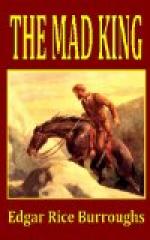“I told you, prince,” corrected Barney, “that the royal blood of Rubinroth flowed in my veins, and so it does. I am the son of the runaway Princess Victoria of Lutha.”
Both Leopold and Ludwig looked their surprise, and to the king’s eyes came a sudden look of fear. With the royal blood in his veins, what was there to prevent this popular hero from some day striving for the throne he had once refused? Leopold knew that the minds of men were wont to change most unaccountably.
“Butzow,” he said suddenly to the lieutenant of horse, “how many do you imagine know positively that he who has ruled Lutha for the past two days and he who was crowned in the cathedral this noon are not one and the same?”
“Only a few besides those who are in this room, your majesty,” replied Butzow. “Peter and Coblich have known it from the first, and then there is Kramer, the loyal old shopkeeper of Tafelberg, who followed Coblich and Maenck all night and half a day as they dragged the king to the hiding-place where we found him. Other than these there may be those who guess the truth, but there are none who know.”
For a moment the king sat in thought. Then he rose and commenced packing back and forth the length of the apartment.
“Why should they ever know?” he said at last, halting before the three men who had been standing watching him. “For the sake of Lutha they should never know that another than the true king sat upon the throne even for an hour.”
He was thinking of the comparison that might be drawn between the heroic figure of the American and his own colorless part in the events which had led up to his coronation. In his heart of hearts he felt that old Von der Tann rather regretted that the American had not been the king, and he hated the old man accordingly, and was commencing to hate the American as well.
Prince Ludwig stood looking at the carpet after the king had spoken. His judgment told him that the king’s suggestion was a wise one; but he was sorry and ashamed that it had come from Leopold. Butzow’s lips almost showed the contempt that he felt for the ingratitude of his king.
Barney Custer was the first to speak.
“I think his majesty is quite right,” he said, “and tonight I can leave the palace after dark and cross the border some time tomorrow evening. The people need never know the truth.”
Leopold looked relieved.
“We must reward you, Mr. Custer,” he said. “Name that which it lies within our power to grant you and it shall be yours.”
Barney thought of the girl he loved; but he did not mention her name, for he knew that she was not for him now.
“There is nothing, your majesty,” he said.
“A money reward,” Leopold started to suggest, and then Barney Custer lost his temper.
A flush mounted to his face, his chin went up, and there came to his lips bitter words of sarcasm. With an effort, however, he held his tongue, and, turning his back upon the king, his broad shoulders proclaiming the contempt he felt, he walked slowly out of the room.




